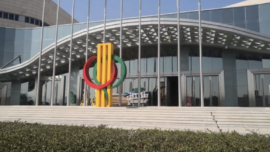
Macau Business | July 2021
By José I. Duarte | Economist, Macau Business Senior Analyst
The highest share of public income, by a wide margin, comes from the gaming concessions. In the 2020 Budget, in line with previous years, its value represented more than 80 per cent of all public revenue. The actual figure, by the end of that year, was about one-third of the initial forecast. After adjustments leading to lower total expenses, the budget closed with a surplus – one-sixth of the initial estimates but still on the positive side.
The share of gaming revenue in the total budget fell to about 55 per cent in the 2021 budget. The amount budgeted suggests the government was expecting total casino gaming revenue for this year to reach around 130 billion patacas.
Indeed, monthly gaming revenue was lately much higher than in the first half of last year (January aside, as the Covid impact came in February). The recovery started in the second half. Yet it has proved less stable and slower than hoped. This year, the holiday periods around the Chinese New Year and Labor Day brought visible animation to the city. However, in both cases, outcomes were less impressive than expected and failed to provide the momentum for a more robust recovery.
The May gaming revenue total figure stood one-quarter below the monthly average implied in the amount initially budgeted – and was still one-third of the corresponding value from two years ago. Thus, just to arrive at the current-year forecast, the coming months till the end of this year would need to post revenues around 20 to 30 per cent higher, on average, than the one obtained in May – which was the best since February 2020. That seems unlikely under the current conditions; and what we can say about gambling revenue, the mainstay of the budget, we can say about visitors, whose expenses provide a substantial contribution for local commerce prosperity. At the time of writing, the visitors and gaming figures for June were not yet known. Nevertheless, circumstantial evidence suggests the numbers may be on the gloomier side.

The 2021 budget assumed a progressive normalization of connections to the outside world. The mid-year has come, and nothing of the sort seems imminent. Almost no hypothetical goal of ‘normalization’ of travel has emerged over the horizon that was not promptly drowned at the first inauspicious or unforeseen event.
The health authorities seem unable or unwilling to adopt a more flexible approach to suit mutable circumstances and commit to a defined, plausible course out of this predicament. This adds to the overall uncertainty, compounded by operational criteria that are not always obviously consistent or evidence-based, and hardly ever clearly elucidated.
Further, there is an unexplained reluctance to take people’s vaccination status into account. That is unhelpful. In practice, however unintentional, that amounts to effective discrimination against those who took their jabs. Worse, it reinforces the reluctant behaviour of many who failed to do so without a serious medical cause.
Under the current situation, it seems impossible to get back to regular life and relaunch the economy. But perpetual seclusion is not a viable alternative, and nothing indicates the disease will disappear any time soon. Consequently, without broad vaccination, we can only ensure lasting vulnerability and increasingly unbearable isolation and uncertainty. The approach becomes self-defeating.
As a matter of urgency, the most decisive actions to take must aim at attaining a much higher vaccination coverage without any further waste of time. Failure to do so is not only of paramount practical health concern – it will amount to a critical policy failure, with health, economic, and social costs that we will endure for years to come.
























